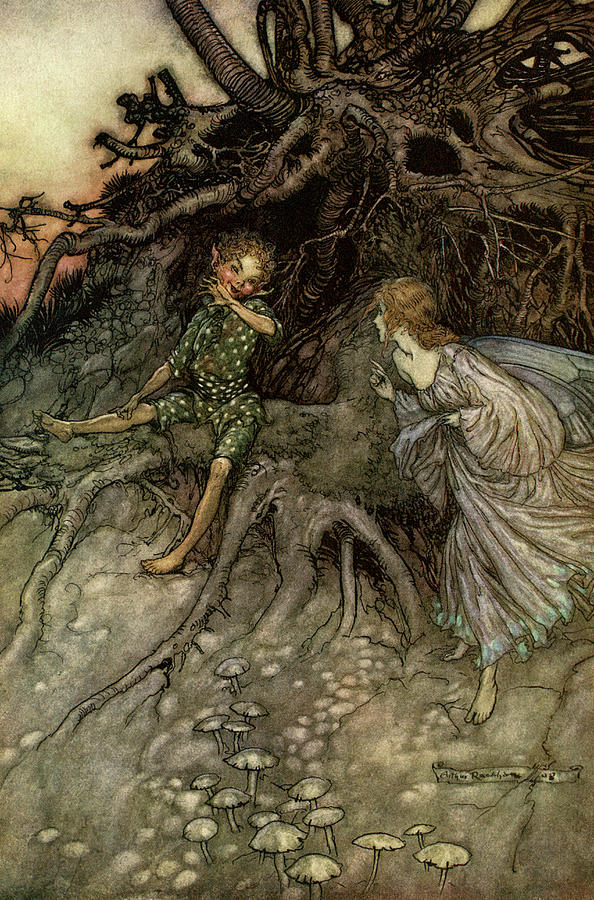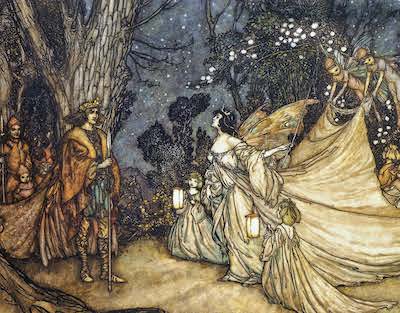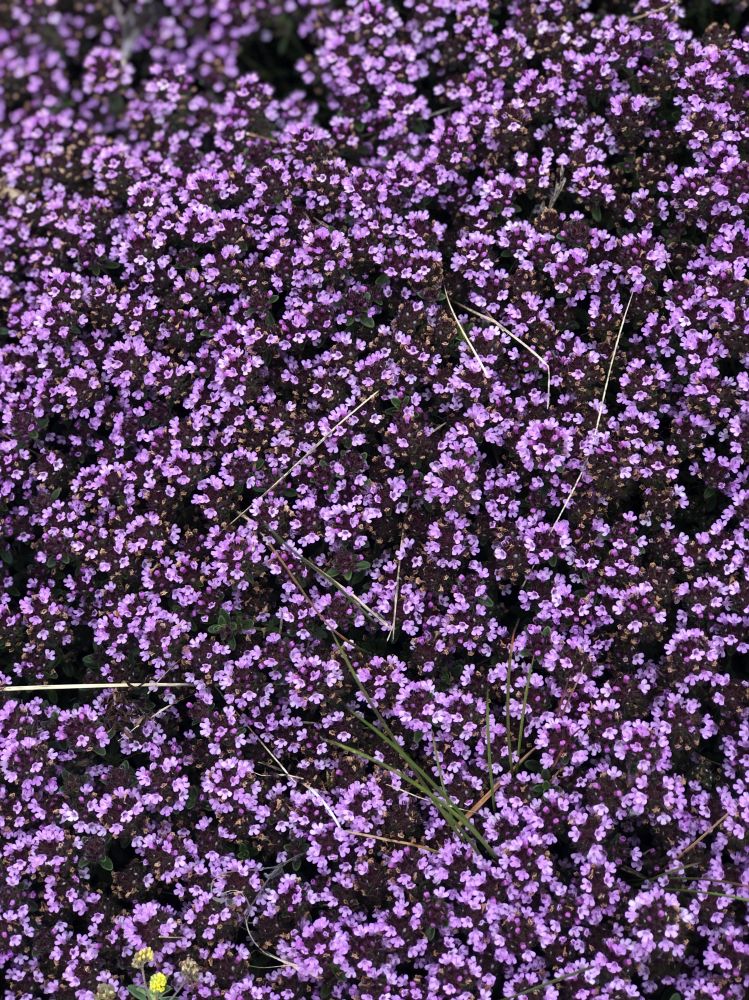(三)你是夜间的天使还是恶魔
在莎翁所处的伊丽莎白时代(1558–1603),想象中的精灵往往与女巫的恶行有关,而且他们在夜间活动。《哈姆雷特》(Hamlet) 第一幕第一场,哈姆雷特的好友霍雷肖(Horatio)与军官马塞勒斯(Marcellus)之间有一段对话:
霍雷肖:
“于是它就像一个罪犯听收到了传票似的惊动起来。我听说公鸡是清晨的喇叭,用高亢尖锐的啼声唤醒了白昼之神。听到它的警告,那些在海里、火里、地下、空中到处浪游的有罪的灵魂,全都快快地躲回自己的巢穴。这句话现在已经证实了”。
(HORATIO
And then it started like a guilty thing
Upon a fearful summons. I have heard
The cock, that is the trumpet to the morn,
Doth with his lofty and shrill-sounding throat
Awake the god of day, and, at his warning,
Whether in sea or fire, in earth or air,
Th' extravagant and erring spirit hies
To his confine, and of the truth herein
This present object made probation.)
马塞勒斯:
“那鬼魂在鸡鸣时就消失了。有人说,每次在我们庆祝圣诞之前,公鸡彻夜啼叫。因此,他们说没有鬼魂敢外出流浪,夜晚很安全。没有外星撞击我们,精灵的魔法无效,女巫不能施咒,那天晚上是圣洁而美好的”。
(MARCELLUS
It faded on the crowing of the cock.
Some say that ever 'gainst that season comes
Wherein our Saviour’s birth is celebrated,
The bird of dawning singeth all night long.
And then, they say, no spirit dare stir abroad.
The nights are wholesome. Then no planets strike,
No fairy takes, nor witch hath power to charm,
So hallowed and so gracious is that time.)

罗宾在《仲夏夜之梦》中的几段台词也证明了精灵们主要在夜间活动。
第五幕第一场,罗宾独白:
“饿狮在高声咆哮,
豺狼在向月长嗥;
农夫们鼾息沉沉,
完毕一天的辛劳。
炉火还留着残红,
鸱鸮叫得人胆战,
传进愁人的耳中,
仿佛预见了死亡。
现在夜已经深沉,
坟墓都裂开大口,
释放出无数幽灵,
在荒野小径奔走。
我们这些小精灵
跟随赫卡忒队伍,
远离太阳的视线,
像黑暗中的幽梦,
如今快乐又欢闹。
为使吉屋无鼠患,
我被遣来勤打扫,
且将门户揩干净。”
(ROBIN
Now the hungry lion roars
And the wolf behowls the moon,
Whilst the heavy ploughman snores,
All with weary task fordone.
Now the wasted brands do glow,
Whilst the screech-owl, screeching loud,
Puts the wretch that lies in woe
In remembrance of a shroud.
Now it is the time of night
That the graves all gaping wide,
Every one lets forth his sprite,
In the churchway paths to glide.
And we fairies, that do run
By the triple Hecate’s team
From the presence of the sun,
Following darkness like a dream,
Now are frolic. Not a mouse
Shall disturb this hallowed house.
I am sent with broom before
To sweep the dust behind the door.)
(注:triple Hecate's team : 赫卡特(Hecate)是月球(Luna)、地球(Diana)和冥界(Hecate))的女神,后被视为魔术和巫术女神)。

第四幕第一场,罗宾对奥伯隆说:“仙王,留心听,我听见云雀在歌唱清晨。”
(ROBIN
Fairy King, attend, and mark.
I do hear the morning lark.)
奥伯隆马上对妻子说:“王后,让我们静静地环游地球,追随着夜影,速度比月亮更快。”
(OBERON
Then, my queen, in silence sad,
Trip we after the night’s shade.
We the globe can compass soon
Swifter than the wandering moon.)
以上的对话似乎告诉读者:天一亮,精灵们就要马上离开,飞到地球上仍被黑暗笼罩的地方。

然而第三幕第二场罗宾和奥伯隆之间的对话透露出了另一个信息,即小精灵与鬼魂不一样,小精灵不需要完全避开日光。
现将对话翻译如下:
罗宾:
“主公,这事我们必须快点办好。
因为黑夜的飞龙已撕破云层,
远处的苍穹晨星闪烁,
随着黎明的到来,一个个游荡的鬼魂
纷纷跑回墓地。那些横死的
在路边或河底腐烂的幽灵,
早已返回爬满蠕虫的尸洞,
担心白昼揭示了他们的耻辱,
他们故意躲开了阳光,
永远与漆黑的夜晚相伴。”
(ROBIN
My fairy lord, this must be done with haste.
For night’s swift dragons cut the clouds full fast,
And yonder shines Aurora’s harbinger,
At whose approach, ghosts, wandering here and there,
Troop home to churchyards. Damnèd spirits all,
That in crossways and floods have burial,
Already to their wormy beds are gone.
For fear lest day should look their shames upon,
They willfully themselves exile from light
And must for aye consort with black-browed night.)
奥伯隆:
“但我们不能与他们相提并论;
晨光中我经常四处游荡,
像守林人那样踏访着丛林:
直到东方火红的天门开启,
太阳从海上升起,万道美丽的光,
将青碧色的咸水变成了一片黄金,
但无论如何,快点办,别拖延,
我们在黎明之前必须把它做好。
(OBERON
But we are spirits of another sort.
I with the morning’s love have oft made sport,
And like a forester the groves may tread
Even till the eastern gate, all fiery red,
Opening on Neptune with fair blessèd beams,
Turns into yellow gold his salt green streams.
But notwithstanding, haste. Make no delay.
We may effect this business yet ere day.)
尽管奥伯隆认为小精灵可以在白天出行,但他仍然赞同必须在天亮之前把所有的要事都办好。从这一点看,小精灵与只在夜晚显灵的其他鬼怪没有太多本质上的区别。

与欧洲传说中的其他小精灵们一样,莎士比亚戏剧中的小精灵们与大自然息息相关,他们是大自然或不可缺的一部分。小精灵们是森林和野花的守护者,《仲夏夜之梦》第二幕中,罗宾遇见的小精灵正在用露水装饰提泰妮娅王后的草环和鲜花,让夜晚湿润而美好。这个情节暗喻小精灵们负责掌控大自然的面貌。此外,莎士比亚还让小精灵们控制季节的更迭,比如奥伯隆与提泰妮娅持续的争吵就导致大自然失衡和季节反转。第二幕第一场,提泰妮娅对丈夫说:“这些都是因为嫉妒而捏造出来的谎言。自从仲夏以来,我们没能在丘陵、山谷、树林、草地、或是细石铺底的喷泉旁,或是奔流的河边,或是海滩上碰面。每次我们准备对着呼啸的风声跳圆圈舞时,总是被你的大吵大闹打扰了兴致。风因为白白对着我们吹奏,生气报复,从海中吸起了毒雾。毒雾化成瘴雨降落在地上,使每一条小河都耀武扬威地泛滥到岸上。牛儿白白牵着轭,农夫枉费了血汗,青青的嫩禾还没有长上芒须便腐烂了。空了的羊栏暴露在一片被淹没的田中,乌鸦因饱餐患疫病死掉的羊群尸体而变肥。九子直棋板上满是湿泥,乱生的杂草中的曲径因没有人行走,已经无法辨认。对人们来说此刻并非冬天,夜晚受不到圣歌的祝福。因此执掌潮汐的月亮,气得脸孔发白,在空气中布满了风湿潮气。因为天时不正,季节出现了反常:鲜嫩的红玫瑰上遍布白色的寒霜,年迈的冬神薄薄的冰冠上点缀着夏天芬芳的蓓蕾花环,实乃嘲讽。春季、夏季、丰收的秋季、暴怒的冬季全都改变了他们惯常的装束,这个困惑的世界再也辨不出哪个是哪个。这个灾祸全因我们的不和所致,我们是一切的根源。”
(TITANIA
These are the forgeries of jealousy.
And never, since the middle summer’s spring,
Met we on hill, in dale, forest, or mead,
By pavèd fountain, or by rushy brook,
Or in the beachèd margent of the sea,
To dance our ringlets to the whistling wind,
But with thy brawls thou hast disturbed our sport.
Therefore the winds, piping to us in vain,
As in revenge, have sucked up from the sea
Contagious fogs, which falling in the land
Have every pelting river made so proud
That they have overborne their continents.
The ox hath therefore stretched his yoke in vain,
The ploughman lost his sweat, and the green corn
Hath rotted ere his youth attained a beard.
The fold stands empty in the drownèd field,
And crows are fatted with the murrain flock.
The nine-men’s-morris is filled up with mud,
And the quaint mazes in the wanton green
For lack of tread are undistinguishable.
The human mortals want their winter here.
No night is now with hymn or carol blessed.
Therefore the moon, the governess of floods,
Pale in her anger, washes all the air,
That rheumatic diseases do abound.
And thorough this distemperature we see
The seasons alter: hoary-headed frosts
Fall in the fresh lap of the crimson rose,
And on old Hiems' thin and icy crown
An odorous chaplet of sweet summer buds
Is, as in mockery, set. The spring, the summer,
The childing autumn, angry winter change
Their wonted liveries, and the mazèd world,
By their increase, now knows not which is which.
And this same progeny of evils comes
From our debate, from our dissension.
We are their parents and original.)

此外,这些掌控大自然的小精灵们不需要建造房屋或城堡,他们以大自然为家,森林是他们的宫廷,树木是他们的房间。提泰妮娅睡在“一处野百里香盛开的斜坡,牛唇报春花和低垂的紫香堇也长在那儿,馥郁的金银花、芬芳的麝香玫瑰和锈红蔷薇张起了一副锦帷”。


提泰妮娅的四个小精灵仆从的名字分别为“豆花”(Peaseblossom)、“芥子”、(Mustardseed)、“飞蛾” (Moth)和“蛛网”(Cobweb),头两位来自植物家族,后两位与动物家族有关。当提泰妮娅与驴头人身的波顿躺在床上时,她命仆从为波顿取一些坚果。她说的很可能是广布于英国林地里的榛子,也是莎士比亚最熟悉的坚果。凯尔特人将榛子视为“知识”之果,笨驴波顿所缺少的正是知识和智慧。榛子又象征着生育,正好配合两人同床共枕的场景。





